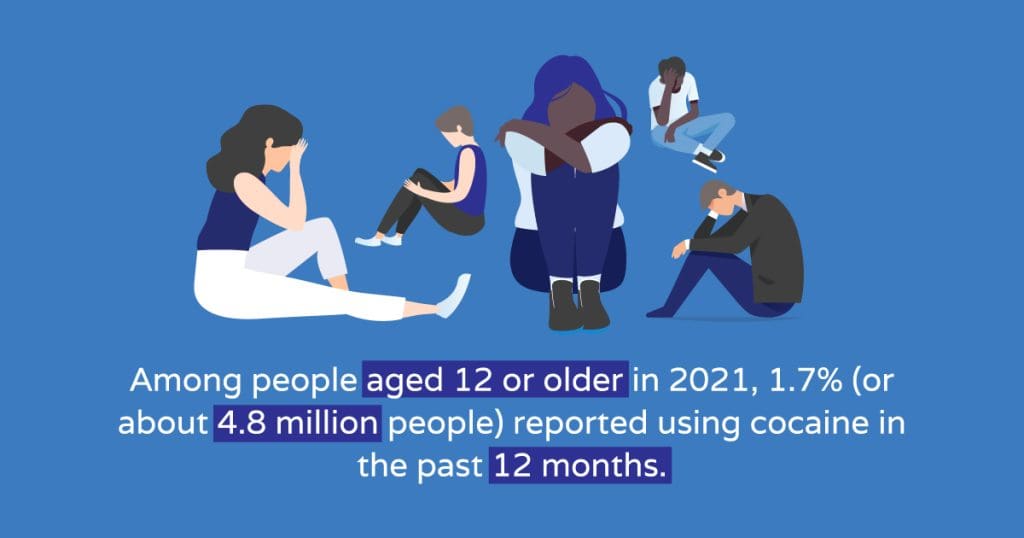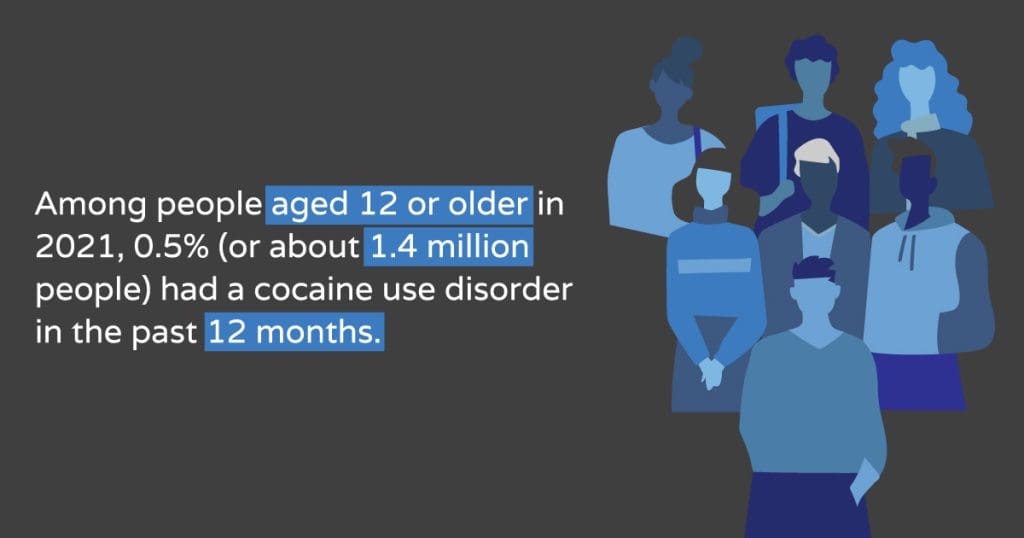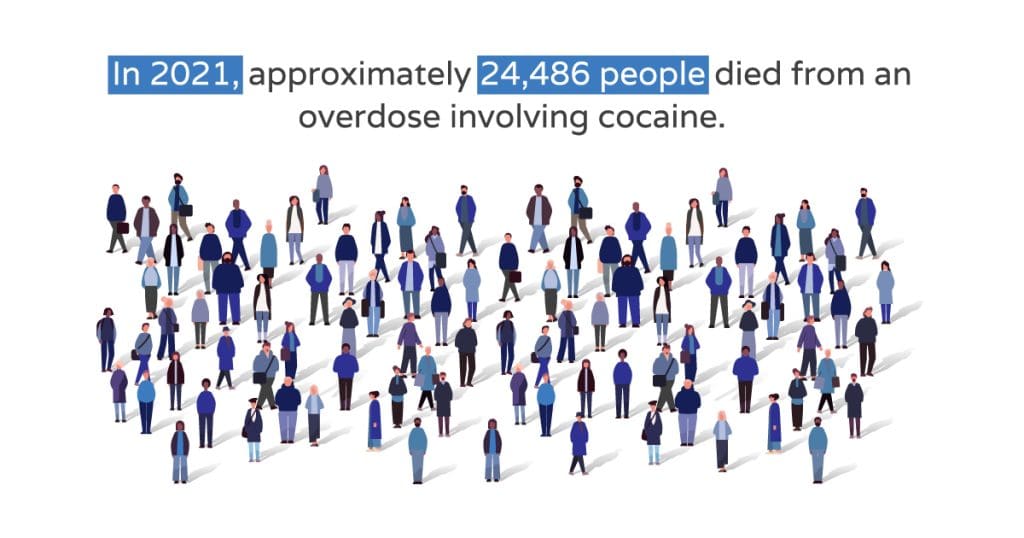Cocaine is a powerful stimulant drug that can jeopardize people’s health and wellness. But, is cocaine addictive? Find out here.
Is Cocaine Addictive? an Overview
Cocaine is a drug that has been popular for decades, often depicted as a glamorous and exciting substance. Its enchanting effect often makes people wonder, “is cocaine addictive?” The reality of cocaine use is far from glamorous. Cocaine is a highly addictive drug that can cause severe physical and mental health problems. In this article, we will explore the properties of cocaine, its addictive nature, why people use it, the signs and symptoms of cocaine use, health risks, its dangers, and available treatment options at Rockland Recovery.
What is Cocaine? is cocaine addictive?
Cocaine is a powerful stimulant drug derived from the leaves of the coca plant. Cocaine is produced primarily in South America and is one of the most widely trafficked illegal drugs in the world. The use of cocaine dates back thousands of years to the indigenous peoples of South America who used to chew coca leaves as a stimulant. Cocaine was also used by healthcare practitioners in the early 1900s to block pain and as a local anesthetic.
Is Cocaine Addictive? How is it Classified?
However, today it is classified as a Schedule II controlled substance in the United States due to its high potential for abuse and addiction. Cocaine can be used in various forms, such as a white powder that is typically snorted, or as a crystal rock form known as “crack” that is usually smoked. Cocaine increases the levels of dopamine – a neurotransmitter associated with pleasure and reward – in the brain.1 This can result in feelings of euphoria, increased energy, and heightened alertness, but it can also lead to dangerous side effects such as heart attacks, seizures, and psychosis.2
is cocaine addictive? Cocaine’s Impact on the Brain
Is Cocaine Addictive? Why Do People Use Cocaine?
Is cocaine addictive? Many people believe they can control their cocaine use, especially when they use it as a “party drug.” However, cocaine use can quickly take over a person’s life. Cocaine is a highly addictive drug. The drug acts on the brain’s reward system by increasing the levels of dopamine, a neurotransmitter associated with pleasure and reward. This leads to feelings of euphoria, increased energy, and heightened alertness. The heightened energy level and increased focus and alertness help people perform physical and intellectual tasks more quickly, especially if taken in smaller amounts. Large amounts of cocaine result in violent and erratic behavior. Some people also claim to feel the opposite effects. However, the brain quickly adapts to the presence of cocaine, and users may need to take higher and higher doses to achieve the same high. This can quickly lead to addiction making the use of cocaine out of control.3
How Addiction Happens
is cocaine addictive? Why Do People Use Cocaine?
People use cocaine for various reasons, including:
- Recreation: Most often, cocaine is used recreationally to enhance social experiences or to party.
- Performance: Cocaine can increase focus, alertness, and energy, making it attractive to athletes, musicians, and other performers.
- Coping: Some people may use cocaine as a way to cope with stress, anxiety, or other emotional issues.
- Addiction: Once someone becomes addicted to cocaine, they may continue to use the drug despite the negative consequences, such as relationship problems, financial issues, or health complications.
How is Cocaine Used?Is cocaine addictive?
Is cocaine addictive? Yes, and with that, people partake in the drug in various different ways.Cocaine can be used in various forms, each with its own set of risks and effects. Here is a list of the most common methods of using cocaine:4
- Snorting: Cocaine is most commonly used by snorting the powder through the nose. The powder is typically divided into lines or bumps and then snorted with a straw, rolled-up bill, or other devices.
- Smoking: Cocaine can be smoked in the form of crack cocaine, which is a crystal rock form of the drug. Crack cocaine is typically heated and then smoked in a pipe or other device, producing a short but intense high.
- Injecting: Some people may also inject cocaine into their veins using a needle and syringe. This method carries the highest risk of overdose and other health complications, including infection and blood-borne diseases.
- Rubbing into gums: A small amount of cocaine can be rubbed onto the gums, which can produce a numbing effect. However, this method is not very common.
Is cocaine addictive? Regardless of the method used, cocaine can be highly addictive and carries a high risk of serious health complications, including heart attacks, seizures, and respiratory failure.
Is Cocaine Addictive? What are the Symptoms of Addiction?
Now that we’ve established that cocaine is inherently addictive, the next concern that arises is how to know someone is abusing cocaine. Cocaine abuse can have serious physical, psychological, and social consequences. If someone is abusing cocaine, they may exhibit several signs and symptoms that indicate a problem.
Indications of Cocaine Use
Is cocaine addictive? Yes, cocaine is addictive. Here are some common signs that someone may be abusing cocaine:
- Changes in behavior: People who abuse cocaine may become more secretive, paranoid, and defensive. They may also become more impulsive, and reckless, and engage in risky behaviors such as driving under the influence.
- Changes in appearance: Cocaine can cause weight loss and a gaunt appearance due to decreased appetite. People who abuse cocaine may also have dilated pupils, bloodshot eyes, and a runny nose.
- Changes in sleep patterns: Cocaine can disrupt sleep patterns, causing insomnia and other sleep problems.
- Financial problems: Cocaine is an expensive drug, and people who abuse cocaine may experience financial problems as a result of their drug use.
- Social problems: Cocaine abuse can cause problems in relationships, work, and other areas of life. People who abuse cocaine may withdraw from social activities and may struggle to maintain healthy relationships.
- Physical symptoms: Cocaine can cause a range of physical symptoms, including increased heart rate, blood pressure, and body temperature. It can also cause chest pain, seizures, and respiratory problems.
- Psychological symptoms: Cocaine can cause anxiety, paranoia, depression, and other mental health problems.

What are the Side Effects of Cocaine? is cocaine addictive?
Cocaine use can produce a range of physical, psychological, and behavioral signs and symptoms, which can vary depending on the method of use, the amount used, and the individual’s overall health. Here is a list of some common signs and symptoms of cocaine use, from mild to severe:5
Mild Symptoms
Mild symptoms of cocaine use can include:
- Dilated pupils
- Increased heart rate
- Increased energy and alertness
- Talkativeness
- Euphoria
- Reduced appetite
- Increased confidence
Moderate Symptoms
Moderate symptoms of cocaine use can include:
- Agitation and irritability
- Anxiety and panic attacks
- Insomnia or difficulty sleeping
- Nosebleeds
- Headaches
- Vertigo
- Increased body temperature
- Tremors and muscle twitches
Severe Symptoms
Severe symptoms of cocaine use can include:
- Chest pain and heart palpitations
- Seizures
- Hallucinations and psychosis
- Paranoia and delusions
- Respiratory failure
- Stroke
- Coma or death
Long-Term Effects of Cocaine Use
Long-term use of cocaine can lead to a range of adverse effects on the body and brain, including:6
- Reduced sensitivity to natural rewards, leading to a focus on seeking the drug over other activities and relationships.
- Increased sensitivity to stress, leading to negative moods and withdrawal symptoms when not taking the drug.
- Tolerance to the drug’s effects, requiring higher doses or more frequent use to achieve the same level of pleasure.
- Sensitization to the drug’s toxicity, increasing the risk of overdose and adverse effects.
- Binging on cocaine; which can lead to irritability, restlessness, panic attacks, paranoia, and even psychosis.
- Damage to the sense of smell, nasal septum, and lungs from snorting or smoking cocaine.
- Puncture marks, infectious diseases, and allergic reactions from injecting cocaine.
- Reduced blood flow in the gastrointestinal tract, leading to tears and ulcerations.
- Weight loss and malnourishment from loss of appetite.
- Toxic effects on the heart and cardiovascular system, including chest pain, inflammation of the heart muscle, deterioration of heart function, and aortic ruptures.
- Increased risk of stroke and seizures.
- Neurological problems, including intracerebral hemorrhage, balloon-like bulges in cerebral blood vessels, and movement disorders such as Parkinson’s disease.
- Impairment of cognitive functions, such as attention, impulse inhibition, memory, decision-making, and motor tasks.
- High risk of relapse, even after long periods of abstinence, due to strong cravings triggered by memories of the drug experience or exposure to drug-associated cues.
Is Cocaine Addictive? A Look into the Withdrawal Symptoms
Is cocaine addictive? Yes, cocaine is addictive and quitting can lead to withdrawal. Withdrawal symptoms of cocaine can be both physical and psychological and may vary in severity and duration depending on the individual’s frequency and duration of use, as well as other factors such as overall health and mental state. 
Common Withdrawal Symptoms
Some common withdrawal symptoms of cocaine include:7
- Intense cravings for cocaine
- Fatigue and exhaustion
- Depression and anxiety
- Irritability and mood swings
- Paranoia and hallucinations
- Insomnia or increased sleep
- Increased appetite and weight gain
- Muscle aches and tremors
- Difficulty concentrating and making decisions
Understanding Withdrawal
Withdrawal from stimulants like cocaine and amphetamines is different from withdrawal from opioids and alcohol. While opioid and alcohol withdrawal can be life-threatening and require medical attention, stimulant withdrawal is typically not associated with immediate medical dangers. However, it is important to note that stimulant withdrawal can still be difficult and uncomfortable, and there is a risk of relapse or other complications. One particular risk of stimulant withdrawal is extreme dysphoria, which can include feelings of intense sadness, hopelessness, and despair. Sometimes, these feelings can lead to suicidal thoughts, which can be dangerous if left unaddressed.
You Don’t Have to Detox Alone – Seek Support for Sustainable Wellness
It is important for individuals who are considering quitting cocaine to seek professional help and support to manage their withdrawal symptoms and reduce the risk of relapse or other negative outcomes.
Treatment Options for Cocaine Addiction
Is cocaine addictive? It is. Cocaine addiction is a serious and complex condition that requires professional treatment to overcome. There are several treatment options available for cocaine addiction, ranging from behavioral therapies to medication-assisted treatment. The goal of treatment is to help individuals stop using cocaine and maintain long-term sobriety. Some of the most common treatment options for cocaine addiction will be detailed below. 
Behavioral Therapy
Behavioral therapy is a type of treatment that focuses on changing the thoughts, attitudes, and behaviors that contribute to cocaine use. One common form of behavioral therapy used to treat cocaine addiction is cognitive-behavioral therapy (CBT), which teaches individuals how to recognize and cope with triggers that can lead to drug use, as well as develop new coping skills to manage stress and cravings.
Cognitive-Behavioral Therapy
Contingency Management
Contingency management is a behavioral therapy that rewards individuals for staying drug-free. For example, a person may receive a voucher or other reward for providing drug-free urine samples.
Motivational Interviewing
Motivational interviewing is a type of counseling that helps individuals identify their reasons for wanting to quit using cocaine and helps them develop a plan to achieve their goals.
12-Step Program
The 12-step recovery program provides support and encouragement to individuals in recovery from cocaine addiction. The program uses a spiritual approach to recovery and encourages members to rely on a higher power for strength and guidance.
Family Therapy
Family therapy involves the participation of family members in the treatment process to help identify and address issues that may have contributed to the addiction or may hinder recovery. It can also provide support for the individual in recovery and improve communication and relationships within the family.
Referrals to Resources
Referrals to school, volunteer, work, and community resources can also help prevent addiction and relapse. These resources can provide individuals with opportunities to stay engaged and active, develop new skills, and build positive relationships with others. They can also offer a sense of purpose and fulfillment, which can be crucial in maintaining recovery.
Rockland Recovery and Cocaine Addiction
At Rockland Recovery, we believe that addressing all factors leading to cocaine addiction is crucial for successful recovery. Our cocaine rehab center in MA focuses on evaluating the environment, familial relationships, and other social factors of individuals struggling with cocaine addiction. We aim to provide our clients with a chance to rebuild their lives in a healthy manner. Our treatment programs are tailored to help individuals confront the issues that led to their addiction. Our team evaluates each client and works to place them in programs that are most likely to lead to an optimal outcome.
We Believe in Personalized, Accessible Healing
We strive to make our care available to everyone, which is why we offer a scholarship program that helps the families of recovering addicts pay for treatment. We work with our clients to determine the best way to pay for treatment, so they can focus on their recovery without worrying about the potential cost of addiction treatment. We understand that recovery is a long and challenging journey, and there are no guarantees regarding the outcome of a stay at our cocaine addiction treatment program. However, we encourage our clients to fully participate in our programs to gain the strength and resilience needed to continue their recovery for the rest of their lives. Our Rockland Recovery team is dedicated to helping people begin and sustain their recovery.
Is Cocaine Addictive? Strategies To Prevent Relapse from Cocaine Addiction
Preventing addiction and relapse can be challenging, but several strategies can help reduce the risk of developing an addiction or experiencing a relapse. Here are some of the most effective methods:
- Education: Educating oneself and others about the risks and consequences of drug use can be a powerful tool in preventing addiction. This can include learning about the effects of drugs on the brain and body, understanding the warning signs of addiction, and being aware of resources available for treatment.
- Healthy coping mechanisms: Developing healthy coping mechanisms can include engaging in physical activity, practicing mindfulness and relaxation techniques, or finding a creative outlet. Healthy coping mechanisms can help manage stress and anxiety, which are common triggers for substance use.
- Strong support system: Having a strong support system is crucial in preventing addiction and relapse. This can include family members, friends, support groups, or a mental health professional. A support system can provide encouragement, accountability, and guidance in times of need.
- Avoiding high-risk situations: Avoiding high-risk situations that may trigger substance use can help prevent addiction and relapse. This can include avoiding social situations where drugs or alcohol are present or avoiding certain environments or people that may be associated with past substance use.
- Seeking professional help: Seeking professional help can be an effective way to prevent addiction and relapse. This can include seeing a mental health professional for therapy or participating in a substance abuse treatment program. Professional help can provide the tools and support needed to overcome addiction and maintain sobriety.
You Are Not Alone – Reach Out to Rockland Recovery Today
It’s essential to recognize that cocaine addiction is a medical condition, not a choice. If you’re struggling with cocaine addiction and feel like you’re trapped, Rockland Recovery can help you regain control of your life. Our tailored cocaine addiction treatment program provides the structure and support you need to boost your chances of a successful recovery. You deserve a chance to lead a happier and healthier life, free from cocaine use. Contact us today at 855.732.4842 or fill out our online form to learn more about our program and how we can help you.
Resources
- https://www.nyc.gov/site/doh/health/health-topics/cocaine-abuse-and-addiction.page
- https://nida.nih.gov/publications/research-reports/cocaine/what-cocaine
- https://www.ncbi.nlm.nih.gov/pmc/articles/PMC2851032/
- https://nida.nih.gov/publications/research-reports/cocaine/how-cocaine-used
- https://nida.nih.gov/publications/research-reports/cocaine/what-are-short-term-effects-cocaine-use
- https://nida.nih.gov/publications/research-reports/cocaine/what-are-long-term-effects-cocaine-use
- https://store.samhsa.gov/sites/default/files/d7/priv/sma15-4131.pdf

